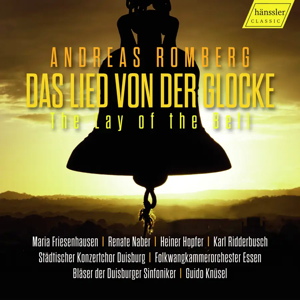
Andreas Romberg (1767–1821)
Das Lied von der Glocke (The Lay of The Bell) Op. 25 (1809)
Maria Friesenhausen (soprano), Renate Naber (alto), Heiner Hopfer (tenor), Karl Ridderbusch (bass)
Städtischer Konzertchor Duisburg; Folkwang Kammerorchester Essen
Bläser der Duisburger Sinfoniker/Guido Knüsel
rec. 1982, Essen, Germany
Hänssler Classic HC23061 [55]
Andreas Romberg – a near coeval with Beethoven – had a modest but not durable reputation. Until I saw his dates, I had to disentangle him from a much later Romberg – the popular operetta/show composer, Sigmund. There is also Bernhard, Andreas’s cousin, the cellist-composer (review). Enough of my ignorance – I hope! Andreas has not scaled the heights but one of his other works (for clarinet and strings) certainly appeared on an early Thea King issue on Hyperion (CDH55076).
Andreas’s standing in large part subsisted locally. His first tuition – in the violin – came from his father, Gerhard Heinrich. Soon he was touring Europe and playing in the Münster Court Orchestra. The Bonn orchestra was his next stop-off and there he met Beethoven. The Hamburg Opera Orchestra soon signed him up and there amongst much else he composed his own Der Messias. Latterly there was a move to the orchestra of Gotha in Thuringia where he saw out his last days.
Das Lied von der Glocke is a large work at almost an hour long. It is in seven parts, each of unequal duration. This is a complete setting (all 424 verses) of a poem by Friedrich Schiller; Romberg in the best of company here. It will come as no surprise to hear that the spark for Schiller had been reflections on the making of a bell in Rudolstadt, Thuringia.
The ambitions of this cantata, sung in German, lie with the Serenata or the Singspiel. I thought of Haydn’s Die Feuersbrunst (a singspiel for marionettes). Romberg’s piece has a pleasing pictorial countenance and occasionally steps out towards Beethoven’s Christus am Olberge but with melting Mozartean cross-currents. The music which is ingenuous – lacking the breezy complexity of a Berwald – is neatly balanced between soloists, chorus and orchestra. There is plenty to interest and catch and to charm the mind and ears.
This ingratiating work is laid out with clear pauses even within Part I (tr. 1) which runs to almost 18 minutes. Instantly Romberg asserts a warm and soothing mien. There is no Promethean conflict here: no rending of clothing; no Sisyphean torment. The soloists and choirs adopt a rounded tone that defies the age of the recording, although in tr. 7 there is a distinct scorched edge to the emboldened strings. There’s a nice duet for tenor and soprano, sections that positively dance and are light-footed. Towards the close of Part I there is some scorchingly high choral singing from the choir. The next two parts track across invention that is dartingly lively and gusty yet has time for a sort of somnolent contentment and for episodes of charming, minuet-style ‘danserie’. The soprano soloist deploys great clarity and she is winningly echoed at several instances by the clarinet. The tenor and bass then sing in euphonious unison. The next four tracks include a jolly allegro-scherzo for the voices and seraphic moments for the choir. After much guileless innocence, Romberg ends with something close to calm repletion.
The booklet in German and English dives into Schiller’s poem first and then touches on Romberg and his life-story. The German text is not supplied; nor is there an English translation.
This recording was first issued on Calig Selecta but there is at least one other version, which I have not heard, on Naïve.
The recording is pretty clear and a sense of contrasting distances between the three elements of the performers is rather well put across. Soloists, choirs and orchestra – the latter two provincial in German terms – are very much in sympathetic style with a work that they probably did not know all that well back in 1982. All in all, this disc makes for a most joyously agreeable introduction to Romberg and his inspirations.
Rob Barnett
Help us financially by purchasing from



















